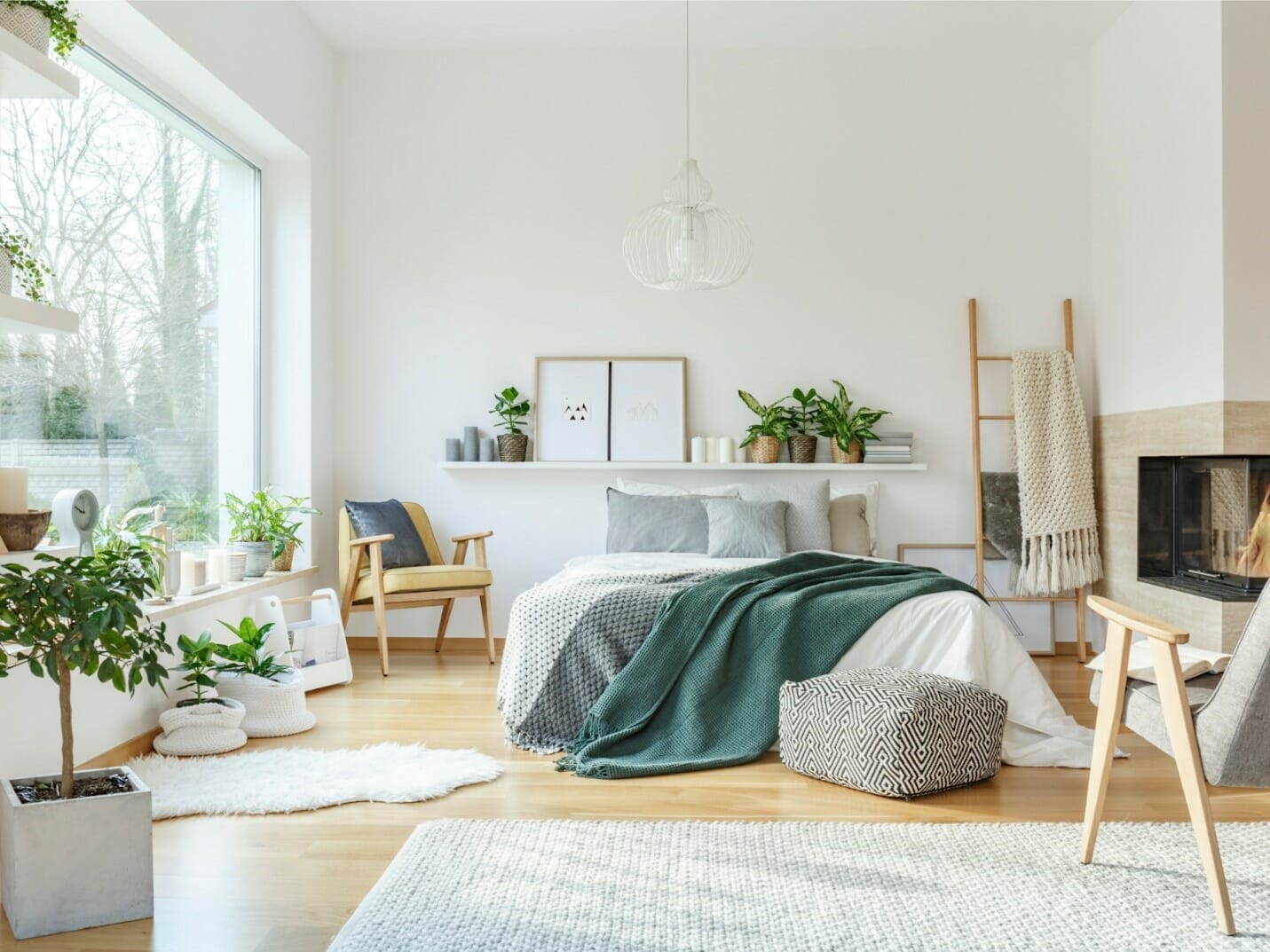
Is having a disorganized home such a big deal? Why not let people live how they want to live?
Having a clean, comfortable home affects people in different ways:

Keeping a clean, organized home is well worth all the physical, mental, emotional, and social benefits that come with it.
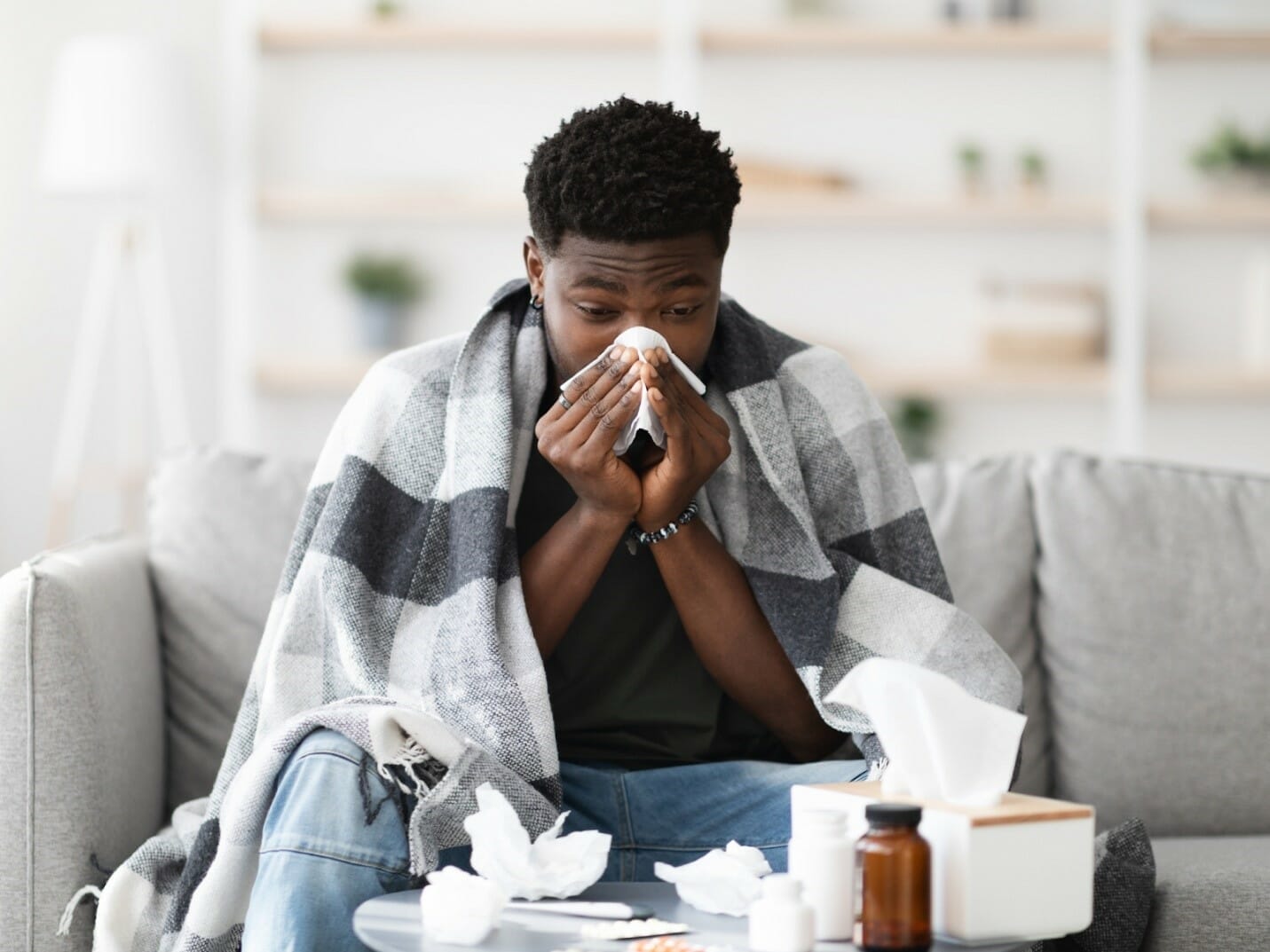
From sleep quality to infection control, cleanliness affects how well your body functions from day to day.
Here are a few ways keeping an orderly environment can help you physically:
Keeping a clean home reduces the risk of illness-causing pathogens being passed to residents of the home.
Food preparation areas should be sanitary, especially after handling raw meat.
Bathroom areas should be cleaned regularly, and animal waste should be taken care of to prevent disease.
People with cluttered homes are more likely to experience insomnia. It’s hard to know if it stems from increased stress levels, difficulty getting comfortable in a cluttered space, or from another cause, but cleaning up clutter should help you get a better
night’s sleep.
Allergies and asthma attacks can be triggered by dust, pet hair and dander, and mold. Keeping homes free of these triggers can improve allergy and asthma symptoms.
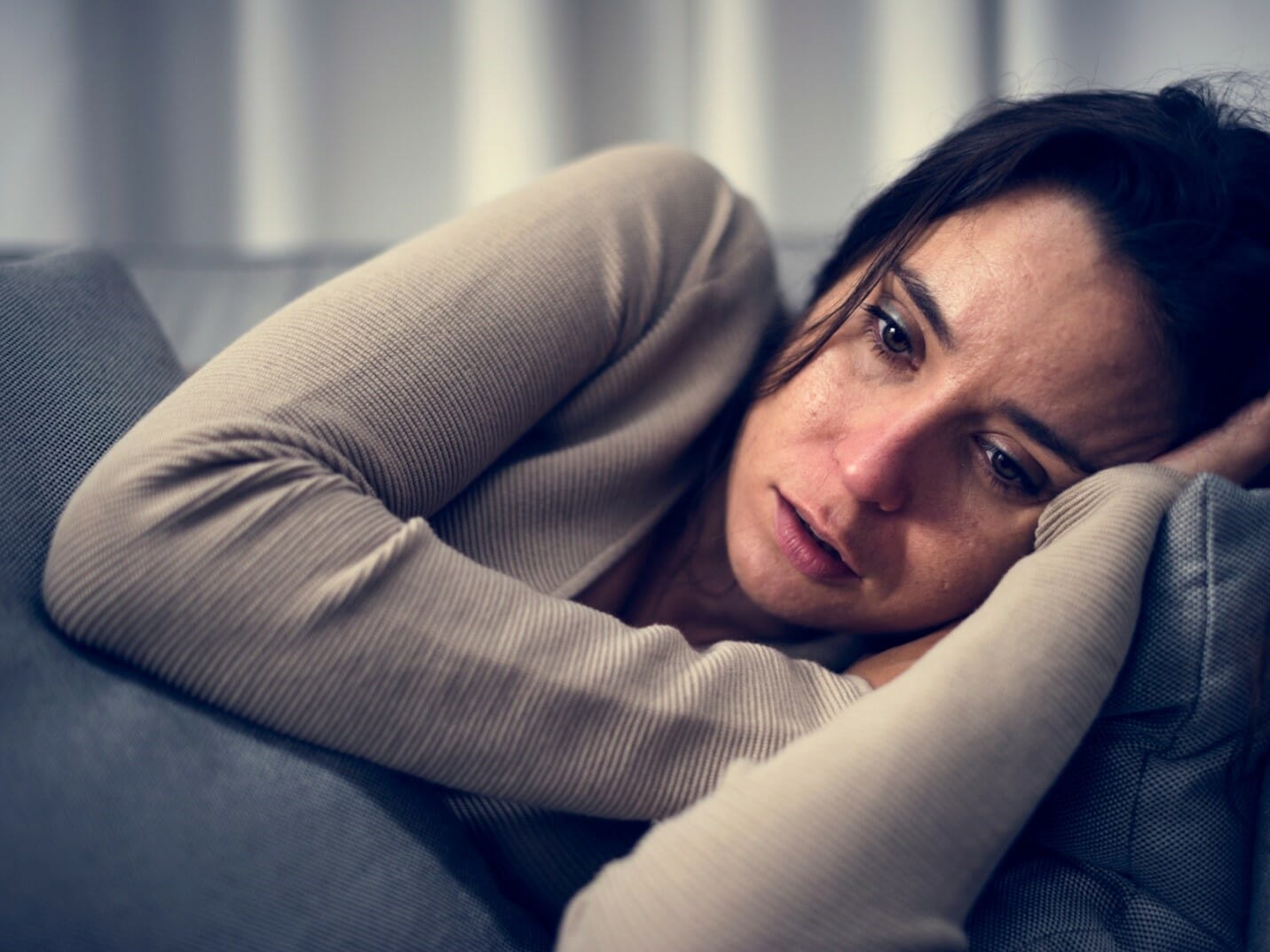
The state of your home can have profound effects on your mental state. A cluttered, disorganized space can stress and overwhelm us. Severely cluttered homes can also cause feelings of shame and anxiety. Here are a few ways keeping your home in order can help you function well mentally:
A clean, uncluttered space helps our minds stay on task without distraction. When we see more items in our line of sight, it can actually slow down our brain’s processing speed and make it more difficult to focus.
When we constantly look around us and see work that needs to be done, it’s difficult to feel calm. How can we relax when we’re surrounded by chaos? Maintaining a clean, organized space will create tranquility and peace-of-mind.
Setting your home in order can be empowering! When you are able to make your space look and feel the way you want it to be, you feel a sense of accomplishment.
When your home is constantly in good condition, you can depend on it as a place to relax and feel at peace. Regardless of what happens outside your home, you have a refuge where you can retreat from the world.
Creativity needs margin and blank space to grow. When your space is not distracting from your thought process, your brain can focus on new ideas.

Just as tasks requiring deep thought can be difficult when our homes are chaotic, our emotions can also be hard to settle when our environment is in upheaval. Here are some emotional benefits to improving the cleanliness of your home:
When you’re in a clean, comfortable environment, you feel better emotionally. Many studies show a relationship between messy homes and unhappiness.
Not only does being in a clean, restful environment contribute to being better able to focus and be mindful, the act of cleaning itself actually offers an opportunity to practice mindfulness. Being mindful of the task at hand can decrease feelings of anxiety and increase feelings of inspiration.
Emotional regulation is the ability to respond to your emotions mindfully. This skill can help you reframe negative emotions and cope with stress. When your home is less cluttered, you are better able to attend to your emotions and find peace.

Your home doesn’t only affect you—it also has an effect on the people around you. When your home is messy and disorganized, it can actually hinder your relationships. Here are some ways cleaning and organizing can benefit you socially:
Cleaning up can create a welcoming space for you to spend time with those you care about. When your home is messy and disorganized, it can be difficult, or even embarrassing, to host others.
You may feel embarrassed about the state of your home, or your friends may not be comfortable there due to cleanliness issues, a lack of seating due to spaces being taken up by clutter, and so on.
When your home is clean and uncluttered, there is space for family to come and stay. Even if you need to set up cots or sleeping bags to accommodate extra guests, they can still be comfortable with you. With a clean floor and stored belongings, this can become a reality.
In severe cases, disorganization and lack of cleanliness can lead to structural issues with your home. Appliances may fall into disrepair and become hazardous, or the home’s structure can even be compromised by the weight of your belongings.
When your things are in order, there is no danger of needing to relocate. However, when your things are in order, there is no danger of being forced to relocate. That stress is non-existent. At a certain point, a health inspector could become involved.

Everyone can improve the state of their homes—we all struggle to keep things clean and hang on to only the possessions we really need.
However, when we take the necessary steps to tidy up and declutter, we can see benefits in many different areas of our lives: physically, mentally, emotionally, and socially.
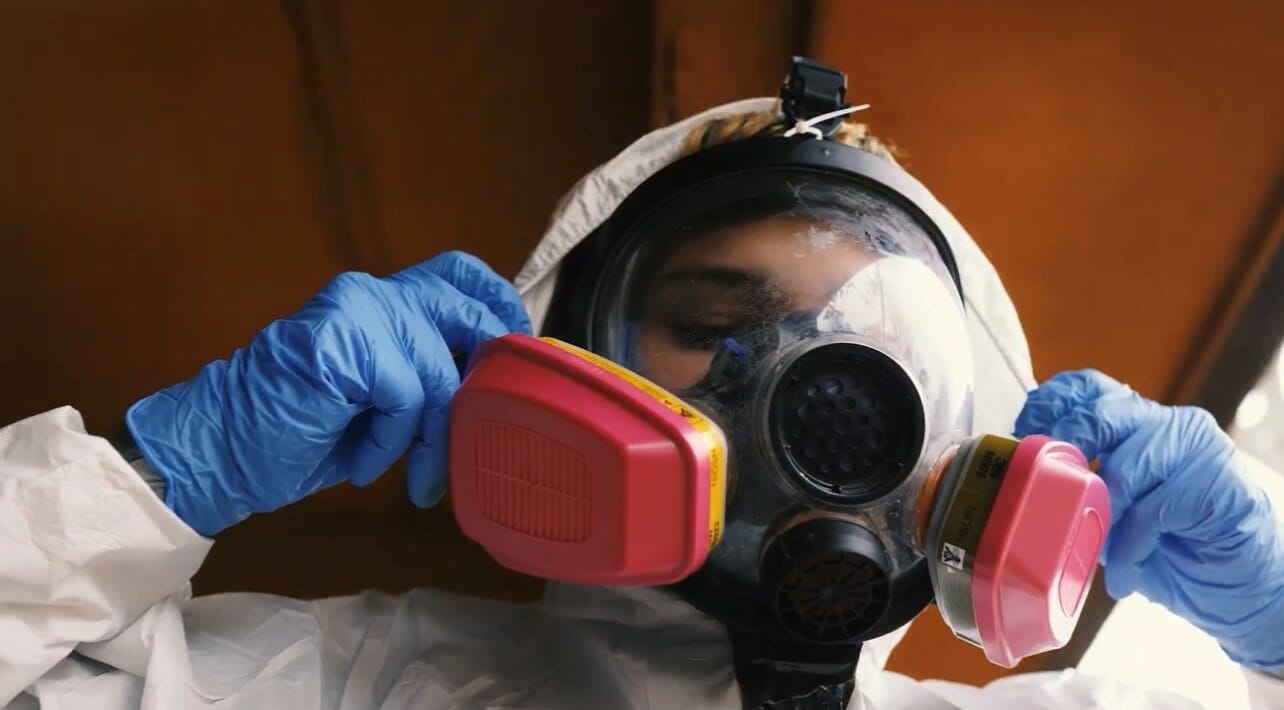
Working in a biohazard suit is a demanding and crucial job, particularly when considering the conditions that arise during the hot summer months. These protective suits are essential for safeguarding workers against hazardous substances, pathogens, and potentially life-threatening situations. However, it is crucial for companies to prioritize the health and safety of their employees who work in such challenging environments. In this blog post, we will explore the conditions of working in a biohazard suit, especially during the summer, and how companies strive to ensure the well-being of their workers.
Biohazard suits are designed to create a sealed environment, protecting workers from external threats. Unfortunately, this also means limited ventilation, leading to increased body heat and perspiration. In hot summer temperatures, the risk of heat stress and exhaustion becomes significantly higher. An article by the CDC describes a study that details the heat strain and stress while working in biohazard suits.
No matter who you are there will be a temperature increase once you get into a biohazard suit and begin working. This increase will vary from person to person. Studies shown in the National Library of Medicine show that this increase can be between 11 degrees Fahrenheit and 20 degrees Fahrenheit. This would mean that on a hot 90-degree day you will be sitting in temperatures up to 110 degrees for extended periods of time.
Wearing a biohazard suit is very physically demanding. These suits are often heavy, restrictive in movement, and can cause fatigue and muscle strain. The discomfort can be further exacerbated by the heat and humidity during summer. When stepping into a biohazard suit, it is comparable to taking a greenhouse-like environment and containing it to a human-sized space. This can quickly lead to heat exhaustion.
Prolonged use of biohazard suits, combined with high temperatures, can lead to excessive sweating and dehydration. Maintaining hydration levels becomes critical for workers to perform their duties effectively and prevent potential health issues.
Working in a biohazard suit during the summer presents unique challenges for the individuals tasked with safeguarding public health and safety. However, Bio-One NW Indianapolis recognizes the importance of prioritizing worker health and safety. By integrating thorough training, cooling, hydration, health monitoring, and enhanced PPE, we can ensure excellent protection and support for workers in demanding environments. The ongoing efforts to enhance work environments and equipment demonstrate a commitment to the well-being of those working tirelessly in biohazard suits, ultimately contributing to a safer and healthier working environment.
If you have any questions, you can reach out to us at any time. We are always here to help.
"Help First, Business Second"
24 / 7 / 365
(317) 435-1611

Whether or not you’ve actually done it, spring cleaning is backed up by centuries of tradition. Many cultures bring a spring cleaning period into their yearly rhythms. For all cultures, the kickoff for spring cleaning is marked by longer days and more sun.
As sunlight hours increase, our bodies produce less melatonin, helping us feel more awake after months of cozy winter slowness. We also have more daylight to accomplish tasks we’ve been putting off.
Even if spring cleaning isn’t part of your personal yearly traditions, you can start now.
With so many blogs, books, and shows promoting organization, resources with ideas are everywhere. Keep reading to learn about our favorite spring cleaning strategies.

The most important step is knowing where to start. Take a walk around your house and decide what needs attention first.
If you’re a list-maker, you can write down your plan of attack. (Or you can just follow the messy vibes.) Knowing your focus makes it easier to jump in and get the work done.
You can also make a list of which days you want to accomplish certain tasks. Choosing just one room, drawer, or cupboard that you want to clean each day can make the entire process less overwhelming. The important thing is that you are moving forward!
It’s hard to clean when you don’t have what you need.
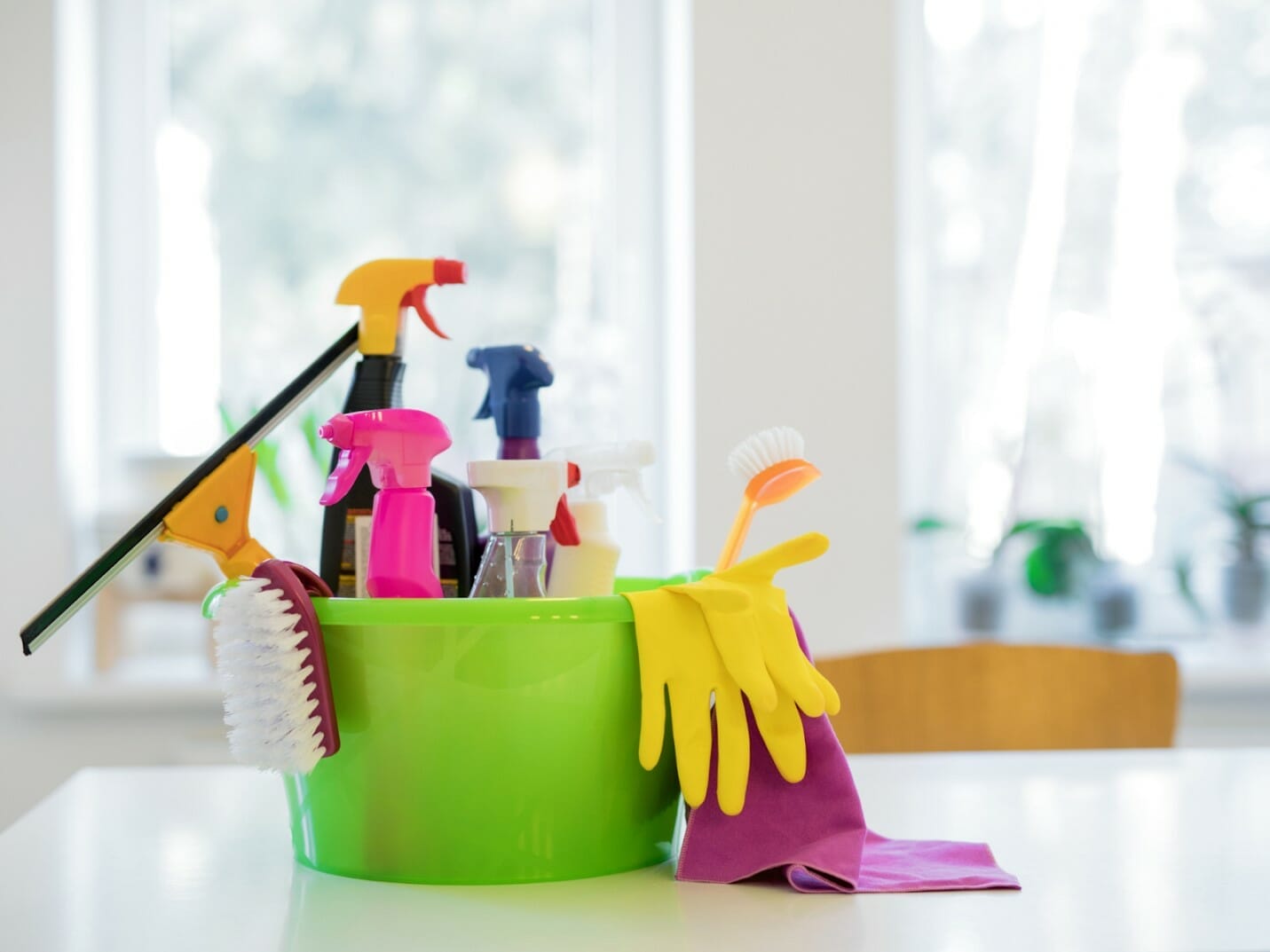
Make sure any cleaning tools or chemicals you need are in an easy-to-find place. It can be helpful to have a caddy or bucket that you can bring from room to room.
Make sure you have what you need, but don’t go overboard. It’s easy to turn a need for supplies into a shopping trip or a reason to procrastinate.
Don’t fall into that trap!
If you don’t have what you need to deep clean today, you don’t have to wait to get started. You can still put items away or, better yet, find items to get rid of.
Most of us don’t have the time or the desire to go on a cleaning rampage. We have limited time and many responsibilities. (But if you’re a person who works well by focusing and cleaning all day, more power to you!)

For the rest of us, setting a timer can be an effective way to get your spring cleaning done, a little bit at a time. Choose an area to clean and a set amount of time (we suggest starting with just 15-20 minutes). Get your timer going and then work hard until it goes off.
Go back to the same area each day with your same timer strategy until it’s clean. Only then is it time to move on to the next part of your home.
Bit by bit, the mess will disappear.
Having a clean home is its own reward, but building some kind of treat into the process always helps. Here are some ways to treat yourself:

Just be cautious about buying yourself something as a cleaning reward.
Often, having too much stuff is the reason our homes get out of hand in the first place. Try to find some other way to pat yourself on the back.
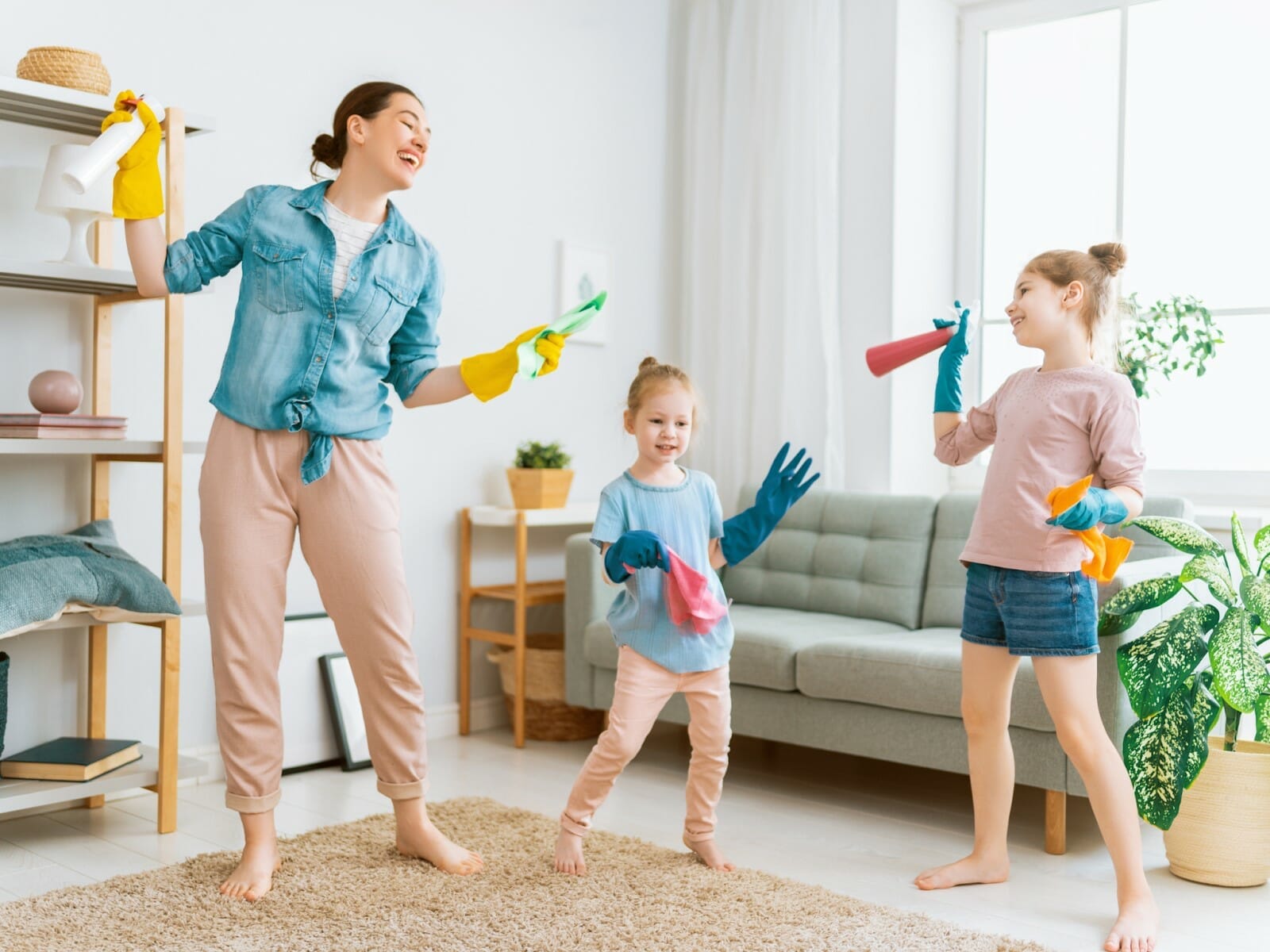
Scientific research shows that making our dreaded tasks into games can help us be more productive and motivated. There are many apps available that reward users for their accomplishments by letting them progress in a game or giving them a virtual gold star.
You don’t need an app to gamify your spring cleaning, however. There are dozens of analog ways to make cleaning into a fun challenge. Here are a few of our favorites.
Brackets are everywhere in the spring, and you can use them to motivate yourself even after the March Madness finals. Download a bracket and fill it out. There are a number of ways you could apply this to spring cleaning:
The ultimate challenge winner gets to decide where everyone goes out for dinner or a treat.
Sometimes, we have so much stuff it’s hard to know where to put it or keep our spaces clean. With the 4-Box Technique, you’ll take four boxes into a room and label them:
Go through the space and categorize all the items that don’t belong in that space (the ones that do belong can be put away immediately).
The trick here is to make sure you deal with your four boxes right away. Don’t let boxes pile up in your home.
Put the stuff you’re keeping in the right place:
For days when you’re overwhelmed or short on time, the 21-Item Toss is the perfect way to get a little bit of decluttering done in as little as 5 minutes.
Grab a garbage bag—or one of the plastic grocery bags so many of us stow under the sink. Walk through your home and find 21 things to throw away. You can gamify it by timing yourself.
Don’t think too hard—if you don’t use it or need it, out it goes!
If you feel like you can’t deal with your home situation on your own, Bio-One has your back. Our discreet team of compassionate, expert cleaners can help you with your home situation—no mess is too big.
Call us today for a consultation.

Bio-One teams across the U.S. answer calls to help their communities and remediate a variety of scenes. In our new blog series, we'd like to bring you into the Bio-One world by sharing stories of the unique and important work we do for local communities.
Here is Week 7 of our Bio-One Weekly Wrap-Up.
Thank You to the Thin Gold Line
The second week of April is a time to celebrate and thank telecommunications professionals who dedicate their lives to serving the public. Often called the thin gold line, 911 dispatchers are true heroes behind the scenes.
Coast to coast, Bio-One teams found fun and unique ways to recognize the Thin Gold Line.
Bio-One Helps Homeless Man with Vehicle Clean Up
This week, News San Diego reported "Homeless man's story inspires San Diego mom to enlist community's help", featuring Rene Flohr and Nicki Chipp-Flohr, owners of Bio-One. The Bio-One duo spotted a NextDoor post asking for anyone who could help 79 year-old, Les, who had been living out of his vehicle and was recently diagnosed with skin cancer. His vehicle was floor to ceiling full of items, and Bio-One was ready to help clean and disinfect the vehicle so it could be sold or donated.
In a message to Bio-One owners, Nicki said, "I am very proud of what we are doing to help someone. I thought you’d all appreciate it, since we live the Bio-One motto of #helpfirstbusinesssecond." We couldn't agree more!
Read the entire story on News San Diego.
A "Week in the Life" at Bio-One
The Bio-One team in Tuscon, AZ had a busy week with work ranging from COVID-19 disinfections, mold remediations, bird dropping clean up, medical waste disposal, suicide remediation, and more.
If you've ever wondered what it takes to be a crime and trauma scene cleaner, we recommend read through the Tuscon team's Weekly Wrap-Up!


Bio-One teams across the U.S. answer calls to help their communities and remediate a variety of scenes. In our new blog series, we'd like to bring you into the Bio-One world by sharing stories of the unique and important work we do for local communities.
Here is Week 6 of our Bio-One Weekly Wrap-Up.
Cherokee County Biohazard Remediation
Lives in the Atlanta area were forever altered on Tuesday, March 16, 2021 after a shooting spree at three metro Atlanta spas left eight people, including six Asian women, dead within the span of 45 minutes.
Our hearts and sympathies are with everyone impacted by this tragedy.
Two weeks after the tragic events in Atlanta took place, Bio-One answered the call to remediate the spa in Cherokee County. Led by Michele O'Brien and Rebecca Phillips, the Bio-One team provided a quick response and thorough decontamination. Read more in our recent blog post.

Tragedy in Rock Hill, South Carolina
As details from the tragedy in Rock Hill, South Carolina unfold, one Bio-One team paid special tribute to the victims, first responders and other local law enforcement officials. Bio-One owners, John and Jen Symons, live in Rock Hill and experienced the police response first-hand. "It's a tight-knit community. We just can't believe it," said Jen Symons.
Their team is currently in communication with local law enforcement, and activity supporting neighbors through this difficult time.
COVID-19 Disinfection at Dojo
This week, we're spotlighting the Atlantic City team where they are regularly disinfecting Ganguly's Mixed Martial Arts. According to Bio-One owner, Victor Russomanno, "We are contracted with a local martial arts studio to disinfect them weekly. In addition to their in-house protocol, we use an electrostatic sprayer to ensure maximum coverage and protection, to ensure those who are training are staying safe through our efforts."
Across the United States, Bio-One teams actively disinfect local businesses, government buildings, and residents in the fight against coronavirus. Learn more about our COVID-19 disinfection process.

Bio-One teams across the U.S. answer calls to help their communities and remediate a variety of scenes. In our new blog series, we'd like to bring you into the Bio-One world by sharing stories of the unique and important work we do for local communities.
Here is Week 5 of our Bio-One Weekly Wrap-Up.
Chocolate Spill Makes for a Sweet Cleanup
In Scranton on March 25, Juan and Nicole Morales received a call for a "chocolate" cleanup. Assuming this was code for a sewage back-up, they rushed to scene to find a different situation entirely. Approximately 100 gallons of milk chocolate had spilled, covering asphalt outside a local business.
This is certainly the sweetest smelling job a Bio-One office has ever taken, but Nicole clarified, "That smell was nice for the first few minutes but at the end I felt sick. Good thing we had an awesome team that pushed through and got this done!"
After scraping the chocolate with a forklift and pressure washing the area, the Bio-One team received a five-star review. Well done!


Behind the Scenes with Citizen's Academy
Many Bio-One owners sign up for their local Citizen's Police Academy to acquaint themselves with the activities of their local police department. This week, Bio-One owner, Ginger Akemon, in Jacksonville, FL earned her Citizen's Police Academy certificate from the Clay County Sheriff's Office.
"Definitely a learning process. Each County has their own, my goal is to go to each county's classes. This was 10 weeks long and over an hour drive each way, but well worth it, " said Ginger.
Hoarding Transformation in Long Beach
In Long Beach, the Bio-One team has been working hard on several hoarding projects. These before and after pictures show the detail and expertise our teams bring to each job.